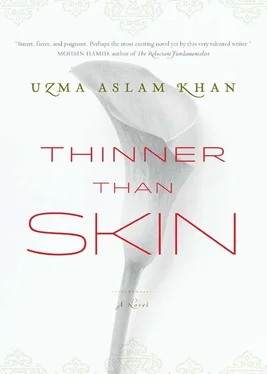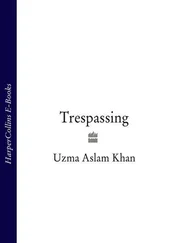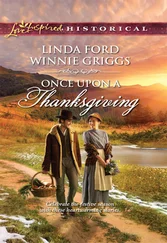Jumanah snaps her fingers. “I want more sugar!”
And with this signal the game has changed. They are mimicking the men who have bothered them all year.
Younis dons a belt that is in fact a drawstring, sticks bullet-stones inside, carries a pine cone beard at his chin, swishes as he walks. “Who am I?”
When Jumanah smiles at him with pearly teeth, he leaves the stage to whisper quickly in her ear.
He returns to his place, repeats, “Who am I?”
“Jihadi!”
And now he wears a mustache made of fat leaves, spits, scratches his balls. Narrows his eyes, convincingly lecherous. Before asking who-am-I, he whispers in Jumanah’s ear.
“Who am I?”
“Inspector!”
He fingers his hair to bring it down to his shoulders — though it does not reach, the effect is clear — and wears a silver sheet — perhaps a biscuit wrapper, one of many items left behind from some traveler, who could not know this is a sacred shrine — as a clasp around his drawstring-belt. He holds two pine needles to his chin for a wisp of a beard. He even carries a bottle. “Who am I?”
This time, Jumanah does not need help. “Ghafoor bai!”
And next he is extremely serious. He walks with a limp, carries his chin low, and his brow is furrowed. “Who am I?”
“Baba!”
And now they are back to their first game, mimicking their mother and grandmother again, except, this time, they are very solemn indeed. Younis carries the pretend smoking branch — cleverly pretend re-lit — around the cave, crying, “Leave our house!”
Jumanah follows him, chanting the same. “Leave! Leave!”
“Not like that,” says Younis. There is much concentration and commentary, as the rituals are tidied up, rehearsed, and re-performed.
“Carry it like this,” insists Younis, and Jumanah sticks her arms up straight.
He then proceeds to tickle her.
While Jumanah squeals, Maryam sucks in her breath, reminding herself and the spirits that they are only children. It is not sacrilege if it is innocent, she says under her breath, where she stifles a laugh, and everything else building up inside. What she really wants, more than anything, is to join them. She would gladly give up fear and sorrow if it meant that for these months in the mountains, she could play. Instead, she watches from the crack in the side of the wall, a tiny space she has peered through many times over the years before entering her cave, for it would be unwise to enter with a traveler inside. She watches the two children, who are solemn once again, and pulls another breath, and holds it, waiting for the breakneck craving in her breast to pass. Of course, it does not pass. But she will not disturb them to satisfy the fierceness of her love. She will leave them enrapt in their game, one in which they do not await the end of the world so much as enjoy it.
Soon after she leaves, their work complete, the children fall asleep. Younis on his back, Jumanah pressed against his chest. In the middle of the night, a feather falls on them, white as the wings that flew through the night to secure it.
During my work on this novel, the following sources on north Pakistan and northwest China proved especially enlightening: History of Northern Areas of Pakistan: up to 2000 A.D . by Ahmad Hasan Dani (Lahore: Sang-e-Meel Publcations, 2001), “The Martyrs of Balakot” from Partisans of Allah: Jihad in South Asia by Ayesha Jalal (Cambridge: Harvard University Press, 2008), and Eurasian Crossroads: a History of Xinjiang by James A. Millward (New York: Columbia University Press, 2007). I would like to extend my appreciation to their authors, and would recommend their work to all those whose love of these areas cannot be sated.
UZMA ASLAM KHANis the author of three previous novels, including The Geometry of God , named one of Kirkus Reviews’ Best Books of 2009. Her fiction and non-fiction have been published around the world. An excerpt from Thinner than Skin was featured in Granta magazine’s widely celebrated issue on Pakistan.
Visit www.AuthorTracker.com for exclusive information on your favorite HarperCollins authors.
Praise for Uzma Aslam Khan’s
The Geometry of God
“[F]uses the romantic, the spiritual and the political … the characters, the poetry and the philosophical questions she raises are rendered with a power and beauty that make this novel linger in the mind and heart.”
— Kirkus , starred review
“Elegant, sensuous and fiercely intelligent, The Geometry of God takes an argument that is in danger of becoming stale — that of fundamentalism vs. free thinking among Muslims — and animates it in a wonderfully inventive story that pits science against politics and the freedom of women against the insecurities of men.”
— Kamila Shamsie
“Uzma Aslam Khan, a fearless young Pakistani novelist, writes about what lies beneath the surface — ancient fossils embedded in desert hillsides, truths hidden inside the language of everyday life … Khan’s urgent defense of free thought and action — often galvanized by strong-minded, sensuous women — courses through every page of this gorgeously complex book; but what really draws the reader in is the way Mehwish taste-tests the words she hears, as if they were pieces of fruit, and probes the meaning of human connection in a culture of intolerance, but also of stubborn hope.”
— Cathleen Medwick, O magazine
“ The Geometry of God is a novel that you don’t just read; you listen to it. It can be irreverent, perverse. It can speak with a whole, fluid beauty. It can be curious, wondrous, noncompliant, like the English in Mehwish’s head … Mehwish is the zauq of the book, the sensory pulse of the novel, who pulls you into a world of her own making. Expect a simultaneous rush that has funniness, absurdity, shock, tenderness … [and] great sex.”
— First City , India
“Such wonderful and persuasive writing. No one writes like her about the body, about the senses, about the physical world. Uzma Aslam Khan is the writer whose new novel I look forward to the most.”
— Nadeem Aslam
“Uzma Aslam Khan has boldly tapped uncharted themes in her latest book, The Geometry of God . She carves a sublime story of new and old with contemporary panache, in which people are real and their fears are prevalent and believable. Khan weaves a complex story whose narrative has a casual energy to it: each voice telling his or her story. Khan is not afraid to say anything.”
— Dawn , Pakistan
“Throughout this complex narrative, Khan writes with unfailing intelligence and linguistic magic. For Westerners, she unlocks doors and windows onto Pakistan and its Islamic culture.”
— Claire Hopley, The Washington Times
“[V]ivid and rich. The reader is rewarded with new viewpoints, a welcome change from the sensationalized and often macabre portrayals of Pakistani people and the country they fight so hard to preserve.”
— Story Circle Book Reviews
“Uzma Aslam Khan’s novel is an eloquent rebuttal to its own character’s claim about modern Islam’s single-mindedness. Skipping across eras and registers of culture — and showing devotion to pleasures as diverse as Elvis Presley and the Mu’tazilites, Aflatoon (the Arabic name for Plato) and evolutionary biology — it is both an example of and an argument for the essential hybridity of every society.”
— Ploughshares
“Uzma Aslam Khan comes from a younger generation of Pakistani authors born and raised in the disrupted decades of the 1980s and 90s whose fiction looks back to those earlier times … As in her previous work, Aslam Khan deploys several narrators, both male and female … but it is the abstract perspectives offered by Mehwish, a character who sees the world with her inner eye, tastes its truths and tells them ‘slant’, that are the most original and captivating … we become attuned to her quietly anarchic voice … complex … inventive …”
Читать дальше












